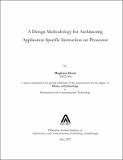Please use this identifier to cite or link to this item:
http://drsr.daiict.ac.in//handle/123456789/167| Title: | Design methodology for architecting application specific instruction set processor |
| Authors: | Dubey, Rahul Desai, Meghana |
| Keywords: | Microprocessors Energy conservation Low voltage integrated circuits Design and construction Computer architecture |
| Issue Date: | 2007 |
| Publisher: | Dhirubhai Ambani Institute of Information and Communication Technology |
| Citation: | Desai, Meghana (2007). Design methodology for architecting application specific instruction set processor. Dhirubhai Ambani Institute of Information and Communication Technology, vii, 51 p. (Acc.No: T00130) |
| Abstract: | Application Specific Instruction-set Processors (ASIP), also referred as extensible processors, represent the state-of-the-art microprocessor architecture. ASIPs are practically leading towards the realization of System-on-a-Chip (SoC) concept; as processor, customised for an application, can be easily integrated in a SoC as pre-designed and pre-verified soft RTL block. Most significant and challenging part for these flexible or programmable processors is the design methodology. The challenge lies in providing a simple configurable design space such that the outcome is optimised, efficient and customised application specific processor hardware, with very short design cycle time. The bottle neck for a processor is chiefly the data path design, as it has computational intensive functional units which add to the major portion of hardware area along with timing. In case of ASIP as well, data path modification is to be achieved as per the requirements. Current electronic design automation (EDA) tools are intelligent and if exploited well can actually help in providing various optimizations in the design. The implemented design approach is based on these aspects of selection of accurate data path elements along with distributed control path and exploiting the inbuilt functionality of EDA tools for generating user defined architecture. In this project a non-pipelined as well as five stage pipelined processor fabrics are implemented with configurable parameters. A library of basic arithmetic functional units is created from which a component of desired characteristic is selected and integrated in the data path. Synthesis of modified processor core is performed with a set of constraints to achieve required trade off between area, power and timing. Multi-supply voltage feature of the synthesis tool is exploited to meet the timing closure of the generated processor core. |
| URI: | http://drsr.daiict.ac.in/handle/123456789/167 |
| Appears in Collections: | M Tech Dissertations |
Files in This Item:
| File | Description | Size | Format | |
|---|---|---|---|---|
| 200221006.pdf Restricted Access | 840.4 kB | Adobe PDF |  View/Open Request a copy |
Items in DSpace are protected by copyright, with all rights reserved, unless otherwise indicated.
